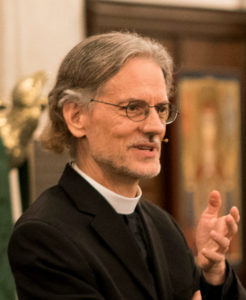The Foolishness of the Cross
In the first chapter of his first epistle to the Corinthians, Saint Paul writes:
“The preaching of the cross is to them that [are] perish[ing], foolishness; but unto us which are [being] saved, it is the power of God.”
Recently preaching on this passage, I first drew out the foolishness of the cross event itself. There we see a bare man impaled on a beam of wood, nails piercing the nerves in his wrists, another nail through his feet; he is hanging in the heat of the sun, not far from the ground. People walk by. Some of them know that it was claimed this man was the Son of God. But God has the power to make everything—which is to say, God can do anything. Is it not foolish to think that the Son of God would be unable to elude such pain, pain so bad it has indeed given us the word “excruciating”? Isn’t that foolish? “If thou be the Son of God, come down from the cross!”
The foolishness is also manifest in a scene from the earlier hours of that same day. Seated in a chair of power, the governor, personal representative of the powerful international empire, looks at this bedraggled, beaten man and asks, “Art thou the King of the Jews?” Could a real king be so poor, so pitiful? Would he allow himself to come to such a grisly end?
The case for the foolishness of the cross is sealed by the man’s death. The stone covered the burial place of his corpse—all that was left of him save shattered hope and sad memory.
But of course, it turned out not to be the end. His body stayed not in the tomb, but was seen—he was seen—outside in the garden and in many other places before he took his throne at the right hand of his Father. Because the Father thus vindicated his Son, Saint Paul says that this foolishness also reveals the power of God. The word of the cross tells us that God’s power is a hidden power. It was hidden in Jesus’ weakness. And sometimes God has chosen to hide it in our own weakness.
* * *
Where in our weakness is the power of God hidden? One place the foolishness of the cross can be hidden is in the foolishness of being pro-life. I have been thinking lately of the rather sudden acceptance in Canada of MAiD (medical assistance in dying), also known as physician-assisted suicide or euthanasia. There have been articles in the Human Life Review documenting the gradual growth of this practice in Canada and Australia as well as in Switzerland and the Netherlands. It has also established footholds in several states in the U.S. To resist all this is going to be seen by “the world” as foolishness. Why should we encourage people to go on living when they no longer see any point to their lives? Why not help them bring the burdensome thing to an end?
Yet to be seen as foolish in the eyes of the world is not a new thing for Christians. One point of this foolishness was noted by ancient Rome: Christians did not expose their children, that is, abandon them to die if they were defective or otherwise unwanted. Christians, at their best, have loved people who were in very bad shape, even when the world would say that it is better to leave such people to die. How foolish it was of God to identify himself with the sick, the imprisoned, the cast-offs! “I was hungry and you fed me,” Jesus says; today he might also say, “I thought I had no choice but to kill myself, but you came to me and gave me hope.”
Why feed, why give hope, to someone whose life is a burden? The calculus of the world—in the first century, in the twentieth, and now in the twenty-first—is that there are lives not worth living. How foolish to resist that calculus! How foolish of God to say there are no lives not worth living!
After my sermon, a woman told me about her mother, who lives in a memory care center. When she visits her, she often sees another elderly lady, whose memory is just a few seconds’ long. And yet everything that comes out of her mouth is joyful. “I want to be like that,” she said to me. And she also shared her belief that every person there has a life worth living.
Then another person told me that some people say the early church had many women who had been rescued as babies. He had not studied the evidence and so was hesitant to endorse it, yet he found it intriguing. The claim is that Christians would save babies that were left out to die, the majority of whom would have been girls, being less wanted. These babies would be reared in the church.
One thinks too of Saint Theresa of Calcutta bringing in the dying from the streets. The foolish message of the cross is understood quickly by those in the despised classes of society, the people reckoned as untouchable: They are often the first to grasp the word of the cross. The cross was the most foolish event of human history, but its hidden power is to lift humankind to our true glory.
The power hidden in weakness, which looks like foolishness, is the reality that God has planted at the center of the universe.










